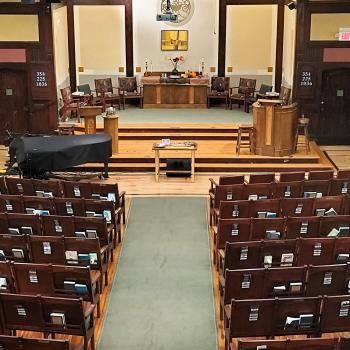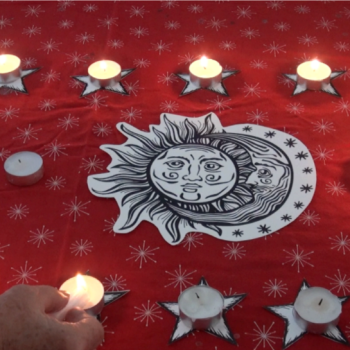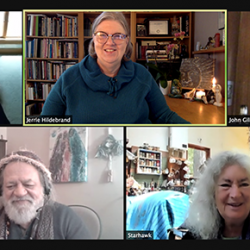The Riddle Contest
The Yaksha said: “Who makes the Sun rise? Who moves the Sun around the sky? Who makes the Sun set? What is the true nature of the Sun?”
The King replied: “The god Brahma makes the sun rise. The gods and goddesses move the Sun around the sky. The Dharma sets the Sun. Truth is the true nature of the Sun.”
The Yaksha asked: “What is heavier than the earth? What is higher than the heavens? What is faster than the wind? What is there more of than there are blades of grass?”
The King replied: “The love of parents is both heavier than earth and higher than the heavens. A person’s thoughts are faster than the wind. There are more sorrows than there are blades of grass.”
The Yaksha asked: “What is it, that when you cast is aside, makes you lovable? What is it, that when you cast it aside, makes you happy? What is it, that when you cast it aside, makes you wealthy?”
The King replied: “When you cast aside pride, you become lovable. When you cast aside greed, you become happy. When you cast aside desire, you become wealthy.”
The Yaksha asked: “What is the most difficult enemy to conquer? What disease lasts as long as life itself? What sort of person is most noble? What sort of person is most wicked?”
The King replied: “Anger is the most difficult enemy to conquer. Greed is the disease that can last as long as life. The person who desires the well-being of all creatures is most noble. The person who has no mercy is most wicked.”
The questions went on and on, but Yudhisthira was able to answer them all, wisely and well.
At last the Yaksah stopped asking questions, and revealed its true nature: the Yaksha was none other than Yama-Dharma, the god of death, and the father of Yudhisthira.
Yama-Dharma said, “It was I who took on the shape of a deer and stole the wooden blocks so the Brahmin could not light the sacred fire.
“Now you may drink of this fair water, Yudhisthira! And you may choose which of your four brothers shall be returned to life.”
“Let Nakula live,” said Yudhisthira.
“Why not Bhima or Arjuna or Sahadeva?” said Yama-Dharma.
“My brother Nakula is the son of Madri,” said the King, “while Arjuna, Bhima, Sahadeva and I are the sons of Kunthi. If Nakula returns to life, then both my mothers, both Madri and Kunthi, will have a living child. Therefore, let Nakula live.”
Then Yama-Dharma spoke kindly as he faded away. “Truly you are called ‘The Just,” he said. “Noblest of kings and wisest of all persons, for your wisdom and your love and your sense of justice, I shall return all of your brothers to life.”
More riddles —
Here are two dozen more of the riddles that Yama-Dharma asked of Yudhisthira:
1. How may a person become secure? — A person becomes secure through courage.
2. How may a person become wise? — A person gains wisdom by living with people who are wise
3. What is best for the Brahmans (those who pursue learning as their life’s work)? — Studying the Vedas, the holy books, is best for the Brahmans.
4. What is best for the Kshathriyas (those who are the warriors and defenders)? Weapons are best for the Kshathriyas.
5. What is best for farmers? — Rain is best for farmers.
6. Who does not close their eyes when sleeping? — Fish do not close their eyes when sleeping.
7. What does not move even after birth? — Eggs do not move even after birth.
8. What does not have a heart? — A stone does not have a heart.
9. What grow as it goes? — A river grows as it goes to the sea.
10. Who is the guest who is welcome to all? — Fire is the guest who is welcome to all.
11. Who travels alone? — The Sun travels alone.
12. Who is born again and again? — The Moon is born again and again.
13. What container can contain everything? — The Earth can contain everything.
14. Out of all things, what is best? — Out of all things, knowledge gained from wise people is best.
15. Out of all blessings, what is best? — Out of all blessings, good health is best.
16. Out of all pleasures, what is best? — Out of all pleasures, being contented is best.
17. Out of all just actions, which is best? — Out of all just actions, non-violence is best.
18. What must a person control in order to never be sad? — A person must control their mind in order to never be sad.
19. What will a person never be sad to leave behind? — A person will never be sad to leave behind anger.
20. What should a person leave behind to become rich? — A person should leave behind desire in order to become rich.
21. What should a person leave behind to be have a happy life? — A person should leave behind selfishness to have a happy life.
22. By what is the world covered? — The world is covered by ignorance.
23. Why doesn’t the world shine brightly? — Bad behavior keeps the world from shining brightly.
24. What is surprising? — It is surprising that we think of ourselves as stable and permanent, when every day we see beings dying.
Illustrations are from the following public domain sources (accessed through the Internet Archive):
Sarus Crane, H. E. Dresser, “A History of the Birds of Europe,” London: 1871-1881.
Yudhistira and the crane, Mahabharata, Gorakhpur, India: Geeta Press, n.d


















